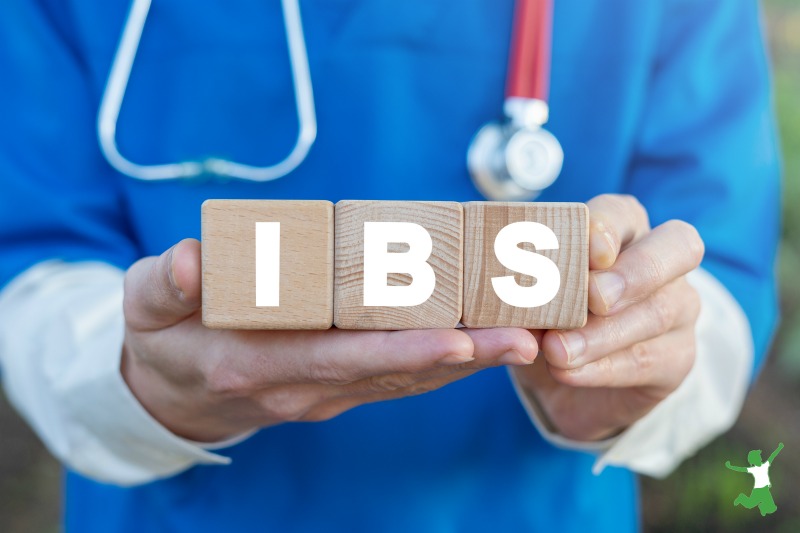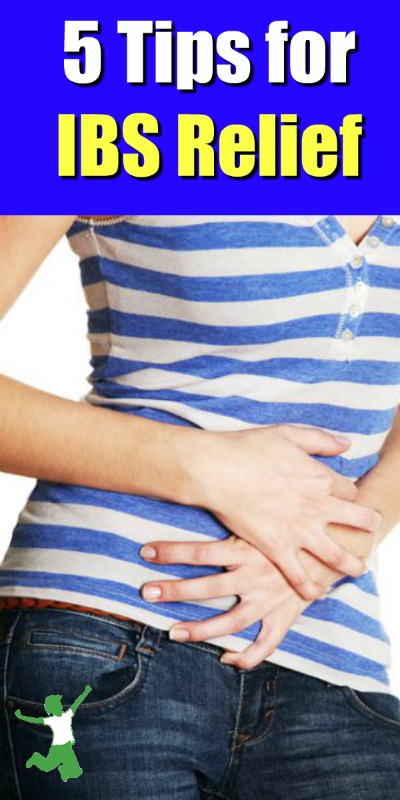How to find relief from Irritable Bowel Syndrome (IBS) naturally with five simple dietary modifications that bring rapid improvement without any medications.

As a Certified Nutritional Therapist who specializes in digestive issues, I was recently asked to appear on a local TV show and talk about irritable bowel syndrome (IBS), a functional bowel disorder that is becoming epidemic.
IBS is becoming so common that you probably know someone who suffers from it.
About 10-15% of Americans are diagnosed with IBS, although the majority don’t seek help for it.
Sadly, they just learn to live with it.
The great news is that there’s a lot you can do to help relieve the symptoms of IBS naturally with food.
In my guest TV appearance, I shared five basic tips that can help heal IBS in many cases.
Now there’s only so much I could say in five minutes.
So after the video below, I will expand on those tips!
These suggestions are a great starting point if you or someone you know suffers from IBS.
The Many Roles of Gut Bacteria
To understand why these five tips to heal IBS are so beneficial, let me clarify my somewhat awkward explanation (dang live TV!) of how the bacteria that reside in our gut affect our health.
Here are just a few of the roles they play in keeping us healthy:
- Manufacture natural B vitamins and vitamin K
- Keeps bowel wall healthy
- Prevents infection
- Breaks down toxins
- Promotes endocrine and immune health
- Regulates bowel movements
We are only beginning to scratch the surface of understanding exactly what these trillions of little buggers do for our health. But what we do know is that there are ten times more of them that live in our gut than there are cells in our body!
In a normal functioning gut, about 80-85% of gut bacteria are beneficial and about 15-20% are pathogenic. Under normal conditions, the good guys keep the bad guys in check and even harness them for beneficial purposes.
However, in many ways, you could say our modern diet and lifestyle are an assault on our gut bacteria which switches up the proportion in favor of the pathogenic bacteria. Factors that can damage our gut bacteria include:
- Antibiotics
- Birth control pills
- Steroids
- Chronic stress
- Infections
- Environmental toxins
- Alcohol
- Poor diet
And when those gut bacteria get out of balance, many digestive problems can manifest, including IBS.
So on that note, here’s a little more information for each of the five tips mentioned in the video above.
Tip #1: Eliminate sugar and processed foods
I hope this one is obvious!
Americans eat A LOT of sugar, to put it mildly.
Sugar and sugar-filled processed foods not only fuel gut bacteria imbalances (aka “dysbiosis”), but they also alter many other aspects of our inner gut environment.
Removing sugar from the diet (with these suggested steps) is critical as it is the main fuel that feeds the fire of IBS.
Tip #2: Reduce (or eliminate) grains
Many people are amazed at the benefits they experience when they start to cut down on their grain consumption.
I’ve never seen anyone who was diagnosed with Crohn’s disease or Ulcerative colitis who wasn’t eating a very high grain diet.
Years of heartburn often evaporate almost overnight on a grain-free diet.
Cutting grain consumption can dramatically help bloating, constipation, heartburn and excess gas.
If you can, start with a 30-day grain-free trial.
If that sounds too difficult, go gluten-free instead.
Gluten is the main protein in wheat, rye, and barley and we’re seeing an astronomical rise in gluten sensitivities.
Gluten even can contribute to cavities in children.
Whether it’s gluten itself or the fact that gluten, a complex protein, exacerbates problems in an already digestively stressed environment, no one can say for sure.
But it can’t hurt to remove it for 30 days as a trial to see if it improves your symptoms.
Of course, there can be other foods that are aggravating your gut besides grains.
Modern pasteurized dairy and modern soy are just the tip of the iceberg but two of the more common digestive-disrupting foods.
If your digestive symptoms don’t dramatically improve after 30 days of gluten or grain-free diet, then work with a practitioner who can help you identify other possible hidden food sensitivities.
Tip #3: Eat more traditional fats
If you’re a regular follower of this website, you don’t need me to expand upon this. However, if you’re new here, let me share a quick story to explain more.
Last week I started working with a client who’s a good example of the type of person I often help.
“Mary” is in her 70s and she was diagnosed with IBS several years ago. Like so many older folks, Mary has moved far far away from the foods of her youth.
When I’m working with a person like Mary, I immediately ask what he or she ate growing up. And the answer is almost always universal.
Home-cooked meals made from scratch with the majority of food sourced right in the community.
I’ve never come across one person who grew up before WWII that was eating anything resembling a vegan, low-fat diet.
Not one.
And for the most part, these people were a lot healthier than we are today.
They didn’t have GERD and IBS and Ulcerative colitis and all the dozens of digestive problems that are now commonplace.
Mary lives in Pennsylvania and she grew up in a Pennsylvania Dutch family.
Growing up, Mary’s family made lots of meat dishes, potato dishes, vegetable dishes, soups and stews, sausages and traditionally fermented sauerkraut.
They ate eggs and bacon for breakfast and cooked with lard almost exclusively. They raised pigs, cows, chickens, and had gardens in the summer and fall.
After a few weeks of eating more like she did as a child, Mary is slowly starting to feel better.
Tip #4: Eat fermented foods
Fermented foods are ALIVE, teeming with the very beneficial bacteria that can help to restore good gut flora and proper digestive functioning.
These beneficial bacteria go by another name you’re probably familiar with: probiotics.
While the best quality probiotics in supplement form can be helpful, fermented foods are Nature’s true probiotics and should be a part of any digestive-healing protocol.
You can find good quality fermented foods in most health food stores.
Look for products that have only salt in the ingredients. A salty brine is all that’s needed for proper fermentation.
Many poor-quality fermented foods are pasteurized and have added sugar, vinegar, colorings and preservatives which compromise the very aliveness of fermented foods.
But you can also learn to make fermented foods at home! This is very simple and there are tons of great online resources that can help you get started.
Tip #5: Consume homemade bone stocks
Unfortunately, like so many traditional foods, bone stocks have mostly disappeared from our diets in favor of bouillon cubes, canned soups, and stocks.
These quasi-stocks mimic the flavor of real stocks via things like MSG, artificial flavorings (often called “natural flavorings” on food labels) and other chemicals and preservatives.
If you want evidence of just how much we’ve moved away from real soups and stocks, check out the soup aisle at any conventional supermarket.
I once counted over 90 varieties of Campell’s and over 70 varieties of Progresso! These are NOT traditionally prepared soups and stocks.
Just take a look at the ingredient label. It’s scary.
Real bone stocks get their digestive healing benefits from REAL bones! So you do have to make these yourself. Which is not hard!
I teach all my clients how to do this and send them home with recipes. If you’re new at it, just start with simple chicken stock.
Need more help?
Of course, as simple as all this sounds, I also know through helping folks with IBS in my clinical practice that it’s not simple for many.
I grew up in the 80s and 90s and most from my generation (self-included) did not grow up making bone stocks, fermenting vegetables or eating anything remotely resembling a traditional foods diet.
Just getting refined sugar out of your life can seem totally overwhelming!
Be sure to seek out professional help if you are finding that implementing any of the steps above is overly challenging.
If you need more recipe ideas on your road to healing, my book Fearless Broths and Soups: Ditch the Boxes and Cans with 60 Simple Recipes for Real People on Real Budgets may prove helpful!

References
Gut and Psychology Syndrome by Dr. Natasha Campbell McBride
Digestive Wellness by Elizabeth Lipski
Gut Solutions by Brenda Watson, ND and Leonard Smith, MD
More Information
FPIES: Resolving the “Other” Food Allergy
GAPS Diet Heals Ulcerative Colitis
Hannah’s Story: 2 Years on GAPS Diet Heals Autism
GAPS Heals Chronic Stomach Pain and Bloating








Tabi Watts
Rick Pat
The thing that helped me and eventually cured me was taking wheat grass powder. I started the meds. given to me by the Dr. and they helped some of the time, but somehow I got to thinking that I needed to get greens into my body, and that really worked! If I forgot it for a day or two, I would be right back to the familiar pains and diarrhea. After a few months, I didn’t take the pills any more. Finally after at least a year, I never relapsed. I still try to take it, but forget a lot due to the fact that my body isn’t reminding me. I bought the powder and put it in water, but there are also pills if you can’t stand the taste. It tastes like grass! Hope this helps someone. I used to tell everybody cause I was so excited that something worked.
There is no gluten in the wheat grass. It is a vegetable at the point that it is cut. I definitely recommend an organic wheat grass.
Many cases of IBS are actually active cases of H. pylori bacterium. Over 60% of the population has it and doesn’t even know. Ask your dr. Look it up. Know!!!
Amy Collins
Sally, have you considered this idea?
Danie Fuller I will never give up my grains!!! I’m okay with the other changes.
Laury Ann Raiken gosh that was a good article. A lot if IBS articles say to eat more fiber, which makes things worse. And ta da! We do those things listed in flowtox. I’m going to try getting the bones at WF for stock. I’m still unsure of fermenting, so I want to try it at least once this session.
Taylor Sampson 🙂
Angela Pettefer here ya go hun